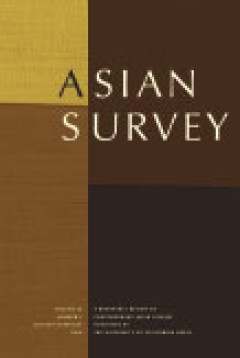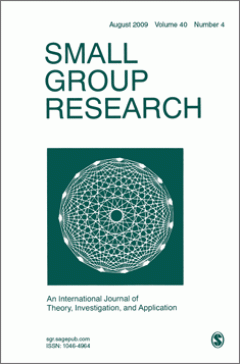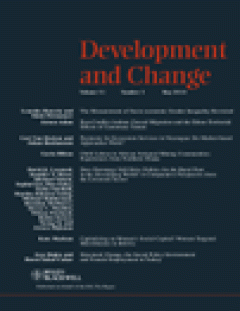Filter by

The Politic of Budgeting in Japan
In the past decade, the Japanese government has revamped its budget institutions twice. This paper examines how these changes have changed the configuration of power among the actors in the budget process. It also explores the implications of these changes for the management of the nations finances.
- Edition
- Vol. 50, No. 5, September/ October 2010.pp. 965-98
- ISBN/ISSN
- 00044687
- Collation
- -
- Series Title
- Asian Survey
- Call Number
- -

Economic Voting in Taiwan
An analysis on the 1996 and 2004 Taiwan presidential elections demonstrated that the voters overall economic experiences under the dominant Kuomintang and level of education mediated the effect of short-term economic conditions on individual vote choice before and after the first power transition.
- Edition
- Vol. 50, No. 5, September/ October 2010.pp. 990-10
- ISBN/ISSN
- 00044687
- Collation
- -
- Series Title
- Asian Survey
- Call Number
- -

Exploring Conflict Management Processes in Jury Deliberations Through Interac…
This study employs interaction analysis to explore micro-level conflict processes and macro-level phasic structures of conflict management in two jury deliberations. Results indicate that the deliberations have fundamentally different conflict management processes. Differences in the tasks posed by the two deliberations and in the norms enacted in them, as well as microinteractional patterns, a…
- Edition
- Vol. 41 no. 4, August 2010. pp. 408-426
- ISBN/ISSN
- 10464964
- Collation
- -
- Series Title
- Small Group Research
- Call Number
- -

Examining Laughter Functionality in Jury Deliberations
Despite a presumption that laughter and a death penalty decision seem incompatible, transcript data of jury deliberations from both the guilt-or-innocence and penalty phases of the State of Ohio v. Mark Ducic trial demonstrate that jurors do laugh. Working from the disparate literature on laughter, we problematized laughter from a group communication perspective and analyzed its functionality i…
- Edition
- Vol. 41 no. 4, August 2010.pp. 386-407
- ISBN/ISSN
- 10464964
- Collation
- -
- Series Title
- Small Group Research
- Call Number
- -

Speaking for the Institution: A Fourth Production Site for Group Members’ I…
Analysis of the transcript of a jury�s deliberations reveals a fourth production site for influence attempts beyond the three identified by Meyers and Brashers. The fourth site involves influence attempts by jurors to uphold the interests of a particular Court and a particular proceeding, and perhaps the interests of the larger judicial system. This gives the Institution a place at the table as…
- Edition
- Vol. 41 no. 4, August 2010.pp. 427-451
- ISBN/ISSN
- 10464964
- Collation
- -
- Series Title
- Small Group Research
- Call Number
- -

Examining Argument in a Naturally Occurring Jury Deliberation
In this article, the authors examine argument in the interactions of members of a naturally occurring jury (State of Ohio v. Mark Ducic). Using the structurational concept of contradictions and a thematic analysis, the authors examine the forms and functions of group argument structures and the role of argument structuring in the jury�s penalty deliberation. Findings are discussed in terms of …
- Edition
- Vol. 41 no. 4, August 2010.pp. 452-473
- ISBN/ISSN
- 10464964
- Collation
- -
- Series Title
- Small Group Research
- Call Number
- -

Counterfactual Thinking in the Jury Room
There may be no more intense group task experience than serving as a decision-making juror on a death penalty case, where a group of strangers is asked to decide whether another person should live or die. Using the deliberation transcripts from the ABC News documentary In the Jury Room, the double homicide trial of State of Ohio v. Mark Ducic was examined to learn more about communication durin…
- Edition
- Vol. 41 no. 4, August 2010.pp. 474-494
- ISBN/ISSN
- 10464964
- Collation
- -
- Series Title
- Small Group Research
- Call Number
- -

Technological Choices in International Environmental Negotiations: An Actor�…
This article applies the main findings of actor�network theory to the outcomes of international environmental negotiations on technological issues. Taking the Convention on Biodiversity (CBD) as a case study, and more precisely its developments on biotechnology and bioprospecting applications, the research identifies three successive stages in the negotiation of technological issues under the b…
- Edition
- Vol. 49 no. 4, December 2010.pp. 570-590
- ISBN/ISSN
- 00076503
- Collation
- -
- Series Title
- Business & Society
- Call Number
- -

NGOs Moving Business: An Analysis of Contrasting Strategies
In this article, we seek to advance understanding of nongovernmental organization (NGO) strategies with regard to influencing corporations. We study two contrasting NGO strategies (symbolic gain and symbolic damage), which simultaneously target the same corporation on the same issue. In so doing, we highlight three previously neglected dimensions of NGO influence strategies: (a) the influence e…
- Edition
- Vol. 49 no. 4, December 2010.pp. 591-618
- ISBN/ISSN
- 00076503
- Collation
- -
- Series Title
- Business Society
- Call Number
- -

MNE-NGO-Host Government Relationships in the Escalation of an FDI Conflict
Increased interaction among multinational enterprises (MNEs), host governments, and nongovernmental organizations (NGOs) has made the implementation of foreign direct investments (FDIs) more complex and potentially more prone to conflict. In this article, by drawing on a longitudinal case study of a conflict concerning a multinational forest industry company�s pulp mill investment in Uruguay, t…
- Edition
- Vol. 49 no. 4, December 2010.pp. 619-651
- ISBN/ISSN
- 00076503
- Collation
- -
- Series Title
- Business & Society
- Call Number
- -

An Historical Perspective on the Interplay of Christian Thought and Business …
To provide effective guidance for business decisions, a set of ethical principles must be stable over time, rather than responding to changes in the business environment for expediency sake. This article examines the ability of religious principles to maintain such stability by reviewing the historical relationship between commerce and Christianity, beginning with early Christianity and conclud…
- Edition
- Vol. 49 no. 4. December 2010.pp. 652-676
- ISBN/ISSN
- 00076503
- Collation
- -
- Series Title
- Business & Society
- Call Number
- -

Corporate Social Performance Disoriented: Saving the Lost Paradigm?
Corporate social performance (CSP) has been a prominent concept in the management literature dealing with the social role and impacts of the corporation; it has been promulgated as a unifying paradigm for the field. However, the concept of CSP is still lacking strong theoretical foundations and empirical validity, suggesting that the paradigmatic status of CSP might be lost. In this paper, the …
- Edition
- Vol. 49 no. 4, December 2010.pp. 677-703
- ISBN/ISSN
- 00076503
- Collation
- -
- Series Title
- Business & Society
- Call Number
- -

Exploring the Resilience of Bt Cotton's ‘Pro-Poor Success Story’
Expectations play a powerful role in driving technological change. Expectations are often encapsulated in narratives of technological promise that emphasize potential benefits and downplay potential negative impacts. Genetically modified (GM, transgenic) crops have been framed by expectations that they would be an intrinsically �pro-poor� innovation that would contribute powerfully to internati…
- Edition
- Volume 41, Issue 6, November 2010, pages 955–981
- ISBN/ISSN
- 0012155x
- Collation
- -
- Series Title
- Development and Change
- Call Number
- -

Ethnicity, Development and Gender: Tsáchila Indigenous Women in Ecuador
In recent decades, indigenous populations have become the subjects and agents of development in national and international multicultural policy that acknowledges poverty among indigenous peoples and their historic marginalization from power over development. Although the impact of these legal and programmatic efforts is growing, one persistent axis of disadvantage, male�female difference,1 is r…
- Edition
- Volume 41, Issue 6, November 2010. pages 983–1016
- ISBN/ISSN
- 0012155x
- Collation
- -
- Series Title
- Development and Change
- Call Number
- -

Constructing Indigenous Subjectivities: Economic Collectivism and Identity in…
This article uses a governmentality analytic to understand the efforts of indigenous leaders from the Ecuadorian Amazon to shape their organizations� members over the past four decades, particularly efforts to promote collective engagement in market-oriented activities. A close examination of one organization's history reveals that leaders� subjectivity-shaping efforts have been strongly influe…
- Edition
- Volume 41, Issue 6, November 2010, pages 1017–1039
- ISBN/ISSN
- 0012155x
- Collation
- -
- Series Title
- Development and Change
- Call Number
- -

The ‘Politics of the Queue’: The Politicization of People Living with HIV…
Starting from a body of literature on movements around �biological citizenship�, this article analyses the political significance of HIV-positive people's collective action in Tanzania. We explore reasons for the limited impact of Tanzanian AIDS activism on the wider political scene, concluding that the formation of a �movement� is still in its infancy and faces many constraints, though some br…
- Edition
- Volume 41, Issue 6, November 2010, pages 1041–1064
- ISBN/ISSN
- 0012155x
- Collation
- -
- Series Title
- Development and Change
- Call Number
- -

Mungiki, Vernacular Organization and Political Society in Kenya
This article uses the concept of �political society� as unfolded by the �subaltern studies� in India to shed new light on present-day political actors and democratic transitions in Africa. It discusses the political practices and discursive terrains of organizations within �really existing� civil society that are based on identities and regarded as outside legitimate civil society. It looks at …
- Edition
- Volume 41, Issue 6, November 2010, pages 1065–1089
- ISBN/ISSN
- 0012155x
- Collation
- -
- Series Title
- Development and Change
- Call Number
- -

The Impact of Privatization on Land Inheritance among Samburu Pastoralists in…
Privatization of communal land among a community of pastoralists in northern Kenya creates a gap in social institutions relating to land inheritance. This analysis shows that the emergence of a new rule for inheritance is a complex social process and that new rules do not arise automatically. Using theories of institutions and collective action, this study examines the process through which rul…
- Edition
- Volume 41, Issue 6, November 2010, pages 1091–1116
- ISBN/ISSN
- 0012155x
- Collation
- -
- Series Title
- Development and Change
- Call Number
- -

Humanitarian Space as Arena: A Perspective on the Everyday Politics of Aid
�Humanitarian space� denotes the physical or symbolic space which humanitarian agents need to deliver their services according to the principles they uphold. This concept, which separates humanitarian action from its politicized environment, is widely used in policy documents and academic texts, even though empirical evidence abounds that this space is in fact highly politicized. To some extent…
- Edition
- Volume 41, Issue 6, November 2010, pages 1117–1139
- ISBN/ISSN
- 0012155x
- Collation
- -
- Series Title
- Development and Change
- Call Number
- -

The Big Question: How Can Nations Break the Cycle of Crime and Corruption?
If not quite as apocalyptic as pope would have us believe, corruption and crime all to often drag nations into a cycle of deprivation and wanton greed-companies bribing bureaucrats in exchange for lucrative contracts, petty graft greasing the palms of low-level civil servants, and powerful politicians enriching themselves at the expense of their people and the advancement of society. How do nat…
- Edition
- Vol. XXVII, No. 1, Spring 2010.pp. 3-16
- ISBN/ISSN
- 07402775
- Collation
- -
- Series Title
- World Policy Journal
- Call Number
- -
 Computer Science, Information & General Works
Computer Science, Information & General Works  Philosophy & Psychology
Philosophy & Psychology  Religion
Religion  Social Sciences
Social Sciences  Language
Language  Pure Science
Pure Science  Applied Sciences
Applied Sciences  Art & Recreation
Art & Recreation  Literature
Literature  History & Geography
History & Geography